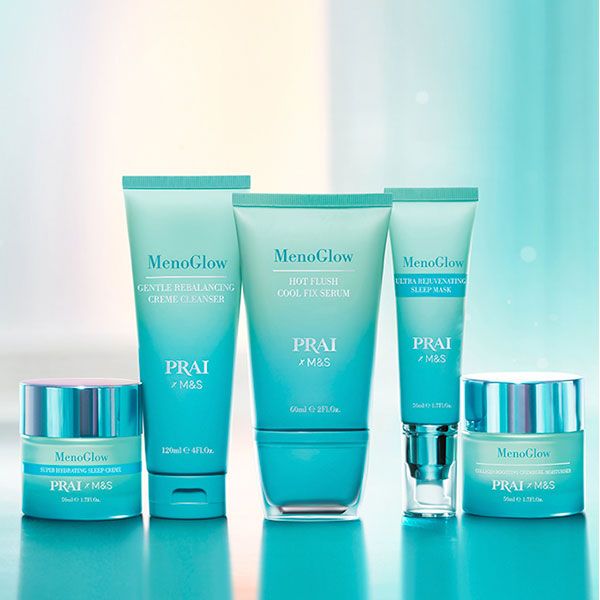From hot flushes to mood swings, there are many symptoms associated with the menopause, and for too long women have been expected to adopt a “put up and shut up” attitude to this stage of life, despite going through huge mental and physical changes.
Luckily, discourse is starting to open around the menopause and perimenopause, as more women in the public eye share their experiences. Brands have started to pay attention, with ranges such as Prai’s MenoGlow. Featuring cooling, collagen-boosting products, MenoGlow has been designed to answer the particular needs of menopausal skin, from redness and hot flushes to extreme dryness that can exacerbate fine lines.
We spoke to dermatologist Dr Alia Ahmed to find out more about how perimenopause and menopause affect the skin, plus tips on skincare ingredients and daily routine.
What are the most common skin complaints associated with perimenopause and menopause?
Increased dryness and wrinkling, loss of skin laxity and skin thinning, night sweats and hot flushes that cause sudden reddening.
Why does the menopause accelerate signs of skin ageing?
When women reach menopause, the level of collagen and elastin in the skin reduces, while skin thinning accelerates. This can lead to dryness, itching, wrinkles and a reduction in suppleness, as well as an increase in sensitivity. As the cell turnover slows down, natural moisturising fats from the skin are lost and glands that secrete oil and sweat become smaller, again contributing to dryness.
Which skincare ingredients should you look out for to help menopausal skin?
Peptides are important as they stimulate collagen production and improve cell turnover. Moisturising ingredients are also key; look out for hyaluronic acid and ceramides. Glycerin and niacinamide are also good. It’s worth using a soap substitute, plenty of emollients and don’t forget to moisturise your body, too.
Why do some women experience acne during this time?
Menopausal acne is a well-known problem to dermatologists, but it is not clear exactly why this happens. It is likely related to the imbalance of male and female hormones that occurs around menopause. After menopause, oestrogen levels decline rapidly, whereas androgens decrease slowly. It’s been suggested that this imbalance (leading to overall higher androgen levels) may lead to acne in some menopausal women.
“Direct treatment of acne can be achieved using topical treatments containing retinoids, benzoyl peroxide and azelaic acid. However, all of these can irritate the skin, so gradually introduce them. Some people will require oral treatment available from a GP or dermatologist.
Having acne can be psychologically distressing, especially at an age when you do not expect to have it. Consider talking to your GP or dermatologist if you feel your skin is stopping you from doing the things you want to.
What does an optimum daily skincare routine around this age look like?
Use a gentle cleanser to wash your face morning and evening to help combat skin dryness.
Consider building in a chemical exfoliant into your routine for pro-ageing benefits but do this gradually to avoid irritation. I suggest starting with a PHA first as this is the least irritating. A good way to incorporate these ingredients is through a cleanser (so use a chemical exfoliant cleanser a few times a week). Other chemical exfoliants include AHAs (for oily skin) and BHAs (for acne-prone skin).
Antioxidant ingredients have a host of benefits including protection from pollution and pro-ageing effects. I suggest regularly using a product that contains antioxidants, such as a serum, before your sunscreen. Examples of antioxidants are vitamin C, omega 3 fatty acids or cloudberry seed oil.
High-factor sunscreen (SPF 30-50) is important at all ages. However, at a time when skin is delicate (and keeping in mind that sun damage is cumulative during your life), it’s now crucial to incorporate sunscreen into your morning regime.
As skin can feel dry when you’re going through the menopause, a moisturiser is helpful to combat dehydration, which can leave skin flaking, feeling tight or irritated. I usually recommend an overnight moisturiser after use of active ingredients at night.
SKIN PRODUCTS FOR MENOPAUSE
Words: Sarah Lafarge


